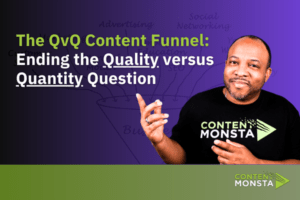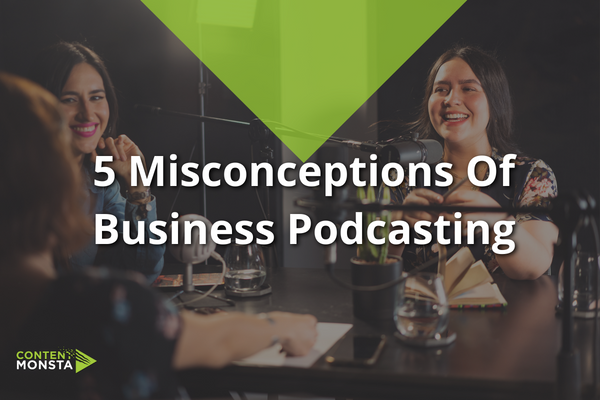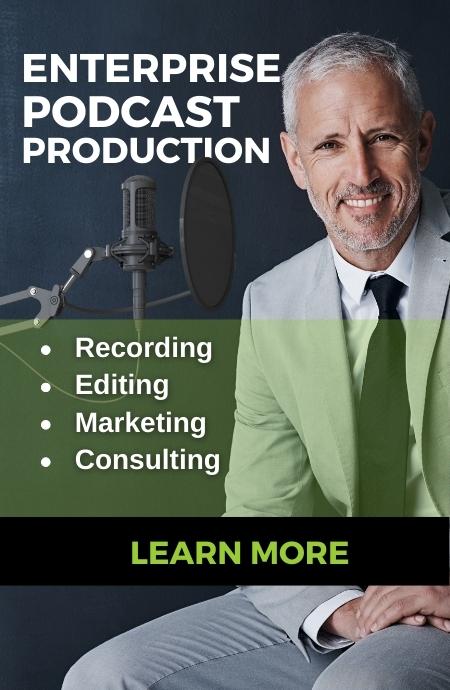This article originally appeared in Forbes.
Podcasting has become a popular marketing tool for businesses of all sizes, and for good reason.
Podcasts offer a unique way to reach a targeted audience, establish authority in your industry and drive conversions.
However, before starting a podcast, it’s important to understand the potential benefits and costs of starting a podcast for your business and clear your mind of the most common misunderstandings about podcasting for business.
Misconception #1: Success is about reaching as many people as possible.
Of the several factors to consider, the first and most important step is to understand the potential benefits that a podcast can bring to your business.
A podcast can help you reach a new audience, generate leads and sales, and establish your brand as an industry leader.
While not transactional or immediate, these benefits can be significant and should be taken into account when determining the potential return on investment (ROI) of launching a podcast.
Because podcasting for business is about your brand, reaching low-value audiences for fame does not produce an ROI. Reaching the right audience does.
Misconception #2: Producing a podcast is difficult.
Images of people sitting in a studio come to mind when many people think about a podcast.
With remote technology and our acceptance of distant conversations, the methods and style in which podcasts are created have changed.
Usually, very little equipment is needed, and utilizing a studio can actually add unnecessary logistical and production costs.
When considering starting a podcast for your business, it is important to understand the setup and functions that go into creating a podcast, especially which parts of the podcast your team should take on and which parts to outsource.
These functions include:
• Understanding if any equipment or special location is needed.
• Determining what technologies to use (from recording to editing to marketing).
• Developing topics.
• Coordinating guests and recording schedules.
• Recording the podcast.
• Editing the podcast.
• Writing metadata such as titles and descriptions.
• Distributing the podcast.
• Repurposing the podcast content.
• Framing and monitoring the podcast customer journey.
Misconception #3: You have to do it all on your own.
Working with an agency for podcast production and content marketing is always an option. All of the functions listed above contribute to the specific costs involved in creating and launching a podcast.
When working with an agency, many of these functions and their cost may be covered by the agency and your company will never see them.
However, understanding that they exist will help you understand the costs charged by the agency.
For most established businesses, partnering with a marketing agency that provides podcast production is the most efficient route.
It is important at this point to understand the extent to which the agency can provide content marketing guidance in addition to simply the production of media.
The three factors that contribute the most to what agencies charge are:
• Format: Will the podcast be produced as audio, video or both?
• Frequency: Will your podcast be weekly, biweekly or monthly?
• Marketing: Will your agency assist in marketing and the creation of marketing content?
You’ll notice that I did not mention equipment.
With the current technology available for content production, equipment costs are negligible for most companies, ranging from $0-$200 for audio-only and only a few hundred more for video.
These are one-time investments that can be used beyond the podcast.
Misconception #4: AI audio production is hands-off.
Recently, advancements in artificial intelligence have made headlines—most often in regard to text content.
The use of AI in audio has also made many recent advancements.
The ability to edit and enhance both audio and video has become more accessible than ever to do-it-yourself podcasters and professionals alike.
For businesses expecting to use AI for podcasting, however, there are several important limits to AI that must be recognized.
Currently, it is still a tool that has three main limitations:
• Complicated edits requiring precise or intricate changes still require human intervention.
• Audio and visual edits can require emotion-based decisions related to the tone or delivery of the content.
• Someone still has to learn the tool in order to use it, which is still a human resource.
Misconception #5: Measuring Business Podcasts Is Comparable To Entertainment Podcasts.
Podcasting is still a fairly new genre, and when researching statistics, you may find yourself comparing your business podcast to celebrity podcasts.
Numbers for business podcasts are rarely in the realm of celebrity or entertainment podcasts because the purpose of the podcast is different.
Therefore, measuring a business podcast’s success has to be done differently.
Business podcasts should be focused on a specific audience. This also means that it is more important to get to the right people rather than as many people as possible.
Rather than downloads and subscribers, businesses should focus on increased web traffic, networking with guests and awareness in their market.
Once you have a clear understanding of the potential benefits, efforts and costs of starting a podcast, you can use this information to create a business case that outlines the potential ROI of launching a podcast.
You will be able to determine if you can manage the podcast in-house or should seek external help.
This will help you to justify the cost of starting a podcast and start your path toward a successful podcast content strategy.
In conclusion, it is important to understand how business podcasting is different from other types of podcasts when starting a podcast for your business.
The format, frequency and marketing strategy will all depend on your specific business and goals, and all contribute to the investment needed.
Technology is changing with new AI offerings, but for professional content, professional input is suggested.
If you don’t have the knowledge and talent in-house, it is important to work with a reputable marketing agency that can provide guidance on all aspects of podcast production and content marketing.

The QvQ Content Funnel: Ending the Quality versus Quantity Question
Marketers often debate whether to prioritize the quality or quantity of content. The QvQ Content Funnel proposes a strategy to balance both, tailoring content type and volume to different sales funnel stages. This method enhances engagement, drives conversions, and builds customer loyalty by delivering the right content at the right time.

5 Digital Marketing Content Types That Drive Business
There are several digital marketing content types that are sure to drive business over the coming years. It’s no secret that content marketing is the driving force behind most, if

Marketing Video Budget – How to secure executive approval
Discover how to secure executive approval for your video marketing budget. This article teaches you to address the critical concerns of CFOs and CMOs, focusing on efficiency, cost-effectiveness, and ROI. Learn strategies for promoting quick turnarounds, diversifying video content, and implementing remote production. Equip yourself with the tools to present a strategic, results-oriented plan that aligns with your company’s goals and impresses your executives.





